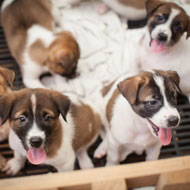Puppy smuggling still rife, investigation reveals

In 2016, almost 276,000 dogs travelled to Great Britain under the PET Travel Scheme.
An undercover investigation by Dogs Trust has revealed that puppy smugglers across central and eastern Europe are continuing to abuse the system.
Shocking footage obtained by the charity shows four-week-old puppies with umbilical cords still attached being subjected to a 30-hour journey.
In another sickening case, puppies were observed vomiting and eating their own faeces during a journey in a packed mini-van.
Vets in Poland and Lithuania were also filmed falsifying pet passports and faking rabies vaccination records, enabling underage puppies to slip through the net without the correct paperwork.
In light of their findings, Dogs Trust is urging people to email their local MP to insist that the government revise ‘inadequate legislation’ to put an end to this horrific trade.
“The number of prosecutions is far too low and the lack of visual checks at ferry ports and borders is unacceptable,” said Paula Boyden, veterinary director for Dogs Trust. “We want to see stronger deterrents including prison sentences for those caught trafficking puppies.”
She continued: “The government must revise pet travel legislation when the UK leaves the EU and ensure that puppies entering this country are healthy, not underage and are not being brought in to sell on to unsuspecting buyers via a scheme meant for non-commercial use.”
In 2016, almost 276,000 dogs travelled to Great Britain under the PET Travel Scheme. The highest number of puppies intercepted by Dogs Trust arrived from Hungary, Poland and Lithuania. Of those puppies seized, 95 per cent were deemed too young to travel and six per cent died due to ill health.
Television and radio presenter Dermot O’Leary is backing the campaign and says: “As a dog lover myself I was horrified to learn that puppies are being smuggled into Great Britain in such terrible condition. I fully support Dogs Trust’s campaign to increase awareness of the puppy smuggling scandal.”
For more information about the campaign, visit www.puppysmuggling.co.uk.



 The Animal and Plant Health Agency (APHA) has updated its online reporting service for dead wild birds.
The Animal and Plant Health Agency (APHA) has updated its online reporting service for dead wild birds.